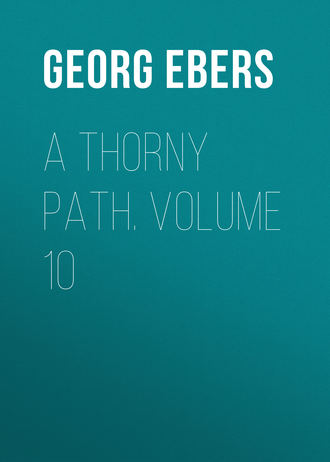
Georg Ebers
A Thorny Path. Volume 10
CHAPTER XXIX
While the lady Euryale preceded her young charge with a lamp up a narrow, dark staircase, Alexander waited in one of the audience-rooms till the emperor should call him. The high-priest of Serapis, several soothsayers of the temple, Aristides, the new head of the night-watch, and other "friends" of the monarch had accompanied him thus far. But admittance to the innermost apartments had not been permitted, for Caracalla had ordered the magician Serapion to call up spirits before him, and was having the future declared to him in the presence of the prefect of the praetorians and a few other trusty followers.
The deputation of citizens, who had come to apologize to Caesar for the annoying occurrences in the Circus, had been told to wait till the exorcisms were over. Alexander would have preferred to hold aloof from the others, but no one here seemed to think ill of him for his thoughtless behavior. On the contrary, the courtiers pressed round him —the brother of the future empress-with the greatest assiduity: the high-priest inquired after his brother Philip; and Seleukus, the merchant, who had come with the deputation, addressed many flattering remarks to him on his sister's beauty. Some of the Roman senators whose advances he had received coldly enough at first, now took up his whole attention, and described to him the works of art and the paintings in the new baths of Caracalla; they advised him to offer himself as a candidate for the ornamentation of some of the unfinished rooms with frescoes, and led him to expect their support. In short, they behaved toward the young man as if he might command their services, in spite of their gray hairs. But Alexander saw through their purpose.
Their discourse ceased suddenly, for voices were audible in the emperor's apartments, and they all listened with outstretched necks and bated breath if they might catch a word or two.
Alexander only regretted not having either charcoal or tablets at hand, that he might fix their intent faces on the wood; but at last he stood up, for the door was opened and the emperor entered from the tablinum, accompanied by the magician who had shown Caesar several spirits of the departed. In the middle of the demonstration, at Caracalla's desire, the beheaded Papinian had appeared in answer to Serapion's call. Invisible hands replaced his severed head upon his shoulders, and, having greeted his sovereign, he promised him good fortune. Last of all great Alexander had appeared, and assured the emperor in verse, and with many a flowery phrase, that the soul of Roxana had chosen the form of Melissa to dwell in. Caracalla would enjoy the greatest happiness through her, as long as she was not alienated from him by love for another man. Should this happen, Roxana would be destroyed and her whole race with her, but Caesar's glory and greatness would reach its highest point. The monarch need have no misgivings in continuing to live out his (Alexander's) life. The spirit of his godlike father Severus watched over him, and had given him a counselor in the person of Macrinus, in whose mortal body the soul of Scipio Africanus had awakened to a new life.
With this, the apparition, which, like the others, had shown itself as a colored picture moving to and fro upon the darkened wall of the tablinum, vanished. The voice of the great Macedonian sounded hollow and unearthly, but what he said had interested the emperor deeply and raised his spirits.
However, his wish to see more spirits had remained unsatisfied. The magician, who remained upon his knees with uplifted hands while the apparitions were visible, declared that the forces he was obliged to employ in exercising his magic power over the spirits had exhausted him. His fine, bearded face was deathly pale, and his tall form trembled and shook. His assistants had silently disappeared. They had kept themselves and their great scrolls concealed behind a curtain. Serapion explained that they were his pupils, whose office it was to support his incantations by efficient formulas.
Caracalla dismissed him graciously, then turning to the assembled company, he gave with much affability a detailed account of the wonders he had seen and heard.
"A marvelous man, this Serapion," he exclaimed to the high-priest Timotheus—"a master in his art. What he said before proceeding to the incantations is convincing, and explains much to me. According to him, magic holds the same relation to religion as power to love, as the command to the request. Power! What magic effect it has in real life? We have seen its influence upon the spirits, and who among the children of men can resist it? To it I owe my greatest results, and hope to be still further indebted. Even reluctant love must bow to it."
He gave a self-satisfied laugh, and continued: "As the pious worshiper of the gods can move the heavenly ones by prayer and sacrifice, so—the wondrous man declared—the magician can force them by means of his secret lore to do his will. Therefore, he who knows and can call the gods and spirits by the right name, him they must obey, as the slave his master. The sages who served the Pharaohs in the gray dawn of time succeeded in fathoming the mystery of these names given to the everlasting ones at their birth, and their wisdom has come down to him through the generations as a priceless secret. But it is not sufficient to murmur the name to one's self, or be able to write it down. Every syllable has its special meaning like every member of the human frame. It depends, too, on how it is pronounced and where the emphasis lies; and this true name, containing in itself the spiritual essence of the immortals, and the outward sign of their presence, is different again from the names by which they are known among men.
"Could I have any suspicion—and here Serapion addressed himself to me— which god he forced to obey him when he uttered the words, 'Abar Barbarie Eloce Sabaoth Pachnuphis,' and more like it! I have only remembered the first few words. But, he continued, it was not enough to be able to pronounce these words. The heavenly spirits would submit only to those mortals who shared in some of their highest characteristics. Before the Magian dared to call them, he must purify his soul from all sensual taint, and sanctify his body by long and severe fasting. When the Magian succeeded, as he had done in these days, in rendering himself impervious to the allurements of the senses, and in making his soul, as far as was humanly possible, independent of the body, only then had he attained to that degree of godliness which entitled him to have intercourse with the heavenly ones and the entire spirit-world as with his equals, and to subdue them to his will.
"He exerted his power, and we saw with our bodily eyes that the spirits came to his call. But we discovered that it was not done by words alone. What a noble-looking man he is! And the mortifications that he practices—these, too, are heroic deeds! The cavilers in the Museum might take example from him. Serapion performed an action and a difficult one. They waste their time over words, miserable words! They will prove to you by convincing argument that yonder lion is a rabbit. The Magian waved his hands and the king of beasts cringed before him. Like the worthies of the Museum, every one in this city is merely a mouth on two legs. Where but here would the Christians—I know their doctrines—have invented that term for their sublime teacher—The Word become flesh? I have heard nothing here," he turned to the deputation, "but words and again words—from you, who humbly assure me of your love and reverence; from those who think that their insignificant persons may slip through my fingers and escape me, paltry, would-be witty words, dipped in poison and gall. In the Circus, even, they aimed words at me. The Magian alone dared to offer me deeds, and he succeeded wonderfully; he is a marvelous man!"
"What he showed you," said the high-priest, "was no more than what the sorcerers achieved, as the old writings tell us, under the builders of the Pyramids. Our astrologers, who traced out for you the path of the stars—"
"They, too," interrupted Caesar, bowing slightly to the astrologers, "have something better to show than words. As I owe to the Magian an agreeable hour, so I thank you, my friends, for a happy one."
This remark had reference to the information which had been brought to Caesar, during a pause in the incantations, that the stars predicted great happiness for him in his union with Melissa, and that this prediction was well-founded, was proved by the constellations which the chief astrologer showed and explained to him.
While Caracalla was receiving the thanks of the astrologers, he caught sight of Alexander, and at once graciously inquired how Melissa had got back to her fathers house. He then asked, laughingly, if the wits of Alexandria were going to treat him to another offering like the one on his arrival. The youth, who had determined in the Circus to risk his life, if need be, in order to clear himself of the taint of suspicion, judged that the moment had come to make good the mistake which had robbed him of his fellow-citizens' esteem.
The presence of so many witnesses strengthened his courage; and fully expecting that, like the consul Vindex, his speech would cost him his head, he drew himself up and answered gravely, "It is true, great Caesar, that in a weak moment and without considering the results, I repeated some of those witticisms to you—"
"I commanded, and you had to obey," retorted Caesar, and added, coldly,
"But what does this mean?"
"It means," began Alexander—who already saw the sword of execution leap from its scabbard—with pathetic dignity, which astonished the emperor as coming from him, "it means that I herewith declare before you, and my Alexandrian fellow-citizens here present, that I bitterly repent my indiscretion; nay, I curse it, since I heard from your own lips how their ready wit has set you against the sons of my beloved native city."
"Ah, indeed! Hence these tears?" interposed Caesar, adopting a well- known Latin phrase. He nodded to the painter, and continued, in a tone of amused superiority: "Go on performing as an orator, if you like; only moderate the tragic tone, which does not become you, and make it short, for before the sun rises we all—these worthy citizens and myself—desire to be in bed."
Blushes and pallor alternated on the young man's face. Sentence of death would have been more welcome to him than this supercilious check to a hazardous attempt, which he had looked upon as daring and heroic. Among the Romans he caught sight of some laughing faces, and hurt, humiliated, confused, scarcely capable of speaking a word, and yet moved by the desire to justify himself, he stammered out: "I have—I meant to assure —No, I am no spy! May my tongue wither before I—You can, of course—It is in your power to take my life!"
"Most certainly it is," interposed Caracalla, and his tone was more contemptuous than angry. He could see how deeply excited the artist was, and to save him—Melissa's brother-from committing a folly which he would be obliged to punish, he went on with gracious consideration: "But I much prefer to see you live and wield the brush for a long time to come. You are dismissed."
The young man bent his head, and then turned his back upon the emperor, for he felt that he was threatened now with what, to an Alexandrian, was the most unbearable fate-to appear ridiculous before so many.
Caracalla allowed him to go, but, as he stepped across the threshold, he called after him: "Tomorrow, then, with your sister, after the bath! Tell her the stars and the spirits are propitious to our union."
Caesar then beckoned to the chief of the nightwatch, and, having laid the blame of the unpleasant occurrences in the Circus on his carelessness, cut the frightened officer short when he proposed to take every one prisoner whom the lictors had marked among the noisy.
"Not yet! On no account to-morrow," Caracalla ordered. "Mark each one carefully. Keep your eyes open at the next performance. Put down the names of the disaffected. Take care that the rope hangs about the neck of the guilty. The time to draw it tight will come presently. When they think themselves safe, the cowardly show their true faces. Wait till I give the signal—certainly not in the next few days; then seize upon them, and let none escape!"
Caesar had given these orders with smiling lips. He wanted first to make Melissa his, and, like a shepherd, to revel with her in the sweetness of their love. No moment of this time should be darkened for him by the tears and prayers of his bride. When she should hear, later on, of her husband's bloody vengeance upon his enemies, she would have to accept it as an accomplished fact; and means, no doubt, would be found to soothe her indignation.
Those who after the insulting occurrences in the Circus had expected to see Caesar raging and storming, were hurried from one surprise to another; for even after his conversation with the night-watch he looked cheerful and contented, and exclaimed: "It is long since you have seen me thus! My own mirror will ask itself if it has not changed owners. It is to be hoped it may have cause to accustom itself to reflect me as a happy man as often as I look in it. The two highest joys of life are before me, and I know not what would be left for me to desire if only Philostratus were here to share the coming days with me."
The grave senator Cassius Dio here stepped forward and observed that there were advantages in their amiable friend's withdrawal from the turmoil of court life. His Life of Apollonius, to which all the world was looking forward, would come all the sooner to a close.
"If only that I might talk to him of the man of Tyana," cried the emperor, "I wish his biographer were here to-day. To possess little and require nothing is the wish of the sage; and I can well imagine circumstances in which one who has enjoyed power and riches to satiety should consider himself blessed as a simple countryman following out the precept of Horace, 'procul negotiis,' plowing his fields and gathering the fruit of his own trees. According to Apollonius, the wise man must also be poor, and, though the citizens of his state are permitted to acquire treasures, the wealthy are looked upon as dishonorable. There is some sense in this paradox, for the possessions that are to be obtained with money are but vulgar joys. I know by experience what it is that purifies the soul, that lifts it up and makes it truly blessed. It does not come of power or riches. Whoso has known it, he to whom it has been revealed—"
He stopped short, surprised at himself; then laughed as he shook his head and exclaimed, "Behold, the tragedy hero in the purple with one foot in an idyl!" and wished the assembled company pleasant slumbers for the short remains of the night.
He gave his hand to a few favored ones; but, as he clasped that of the proconsul Julius Paulinus, who, with unheard-of audacity, had put on mourning garments for his brother-in-law Vindex, beheaded that day, Caesar's countenance grew dark, and, turning his back upon them all, he walked rapidly away. Scarcely had he disappeared when the mourning proconsul exclaimed in his dry manner, as if speaking to himself:
"The idyl is to begin. Would it might be the satyr-play that closes the bloodiest of tragedies!"
"Caesar has not been himself to-day," said the favorite Theocritus; and the senator Cassius Dio whispered to Paulinus, "And therefore he was more bearable to look at."
Old Adventus gazed in astonishment as Arjuna, the emperor's Indian body- slave, disrobed him; for, though Caracalla had entered the apartment with a dark and threatening brow, while his sandals were being unfastened, he laughed to himself, and cried to his old servant with beaming eyes, "To-morrow!" and the chamberlain called down a blessing on the morrow, and on her who was destined to fill the coming years with sunshine for mighty Caesar.
……………………
Caracalla, generally an early riser, slept this time longer than on other days. He had retired very late to rest, and the chamberlain therefore put off waking him, especially as he had been troubled by evil dreams, in spite of his happy frame of mind when he sought his couch. When at last he rose he first inquired about the weather, and expressed his satisfaction when he heard that the sun had risen with burning rays, but was now veiled in threatening clouds.







